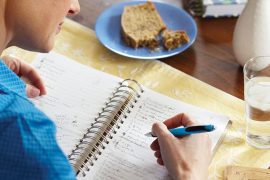A diabetes journal can help in managing diabetes and is a great way to keep track of your condition. When you start a diabetes journal, you need to record two main information – food and blood sugar level. Although these are two things to focus on, your journal may also record other information like physical activity, medications, illnesses etc.
Keeping an Accurate Record of Your Food
One of the purposes of the journal is to keep track of all the food and beverages you consume through the day. This may seem very straight forward but there are many who fail to do this accurately and effectively. Here are some pointers which may help you:
- Always write your diabetes journal as and when you are eating. If you sit down at the end of the day to try to write down the things you ate, it is likely that you end up forgetting what you had. It will also be difficult to recall the exactportions of what you ate.
- Begin a meal or snack by recording what you will be eating and its portion. Do this even before putting any edibles into your mouth. If you find it difficult to estimate the amount of food you will consume, begin by measuring your food so you will know what certain amount you will end up consuming. As a guide, one serving of meat is about the same size as a deck of cards, which is about three ounces.
- Do not forget beverages. Many tend to leave this out, but beverages also contain sugar and can affect your blood sugar levels.
- Include all condiments, sauces and spreads. These can include sugar, fat and calories which you do not take note of. Some examples are butter, jam, nut butters, ketchup, chilli sauce, mustard etc.
- Record the time you start eating. This is important to remind you when you should be testing your blood sugar levels after eating. It would also make sure that your food and blood sugar level data correspond.
Measuring and Recording Your Blood Sugar Levels
Your diabetes journal should also record your blood sugar levels through the day. Measuring and recording your blood sugar levels can inform you on how your meals, medications and activities affect your blood glucose levels. American Diabetes Association (ADA) suggest that diabetes patients regularly measure blood sugar levels to help in diabetes management. Here are some pointers:
- Make sure that you check up to six times in a day. Your doctor may give you specific instruction when it comes to checking your blood sugar. Doctors will decided when and how many times you should check your blood sugar levels based on your current health, age and level of activity.
- Before eating is a good time to check your blood sugar to know your blood sugar level at its lowest. It is also a good time to check an hour or two after you start eating in order to see what your blood sugar level is at its peak. It can also tell you how your meal affected your blood sugar levels
- Before bedtime is also an ideal time to check your blood sugar level in order to ensure that it is not too low. Usually, before you eat your bedtime snack is good.
- Before and after exercising are ideal times to measure your blood sugar levels too. This help you see how your physical activity affects your blood sugar control.
- Make sure you record the time of measuring in your diabetes journal.
Make Your Diabetes Journal Enjoyable
Besides recording food intake and blood sugar readings in your journal, there are other things you can keep track of to help in your diabetes management such as:
- Physical activity – record time, duration and type of physical activity to see how it affects your blood sugar levels
- Medication – change of dosage or medication can affect blood sugar levels
- Symptoms – documenting any symptoms you have suffered and the time it occurred can help in early diagnosis of complications and its prevention
Feel free to write down anything you want in your journal. The next time you visit your doctor, share your journal as this can help with diagnosis and treatment.




